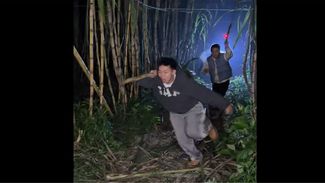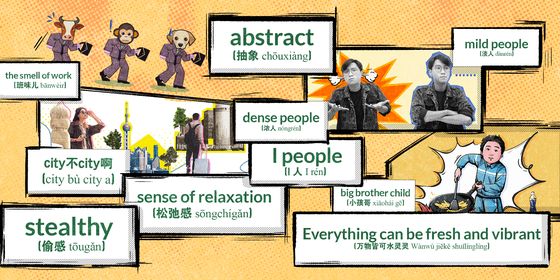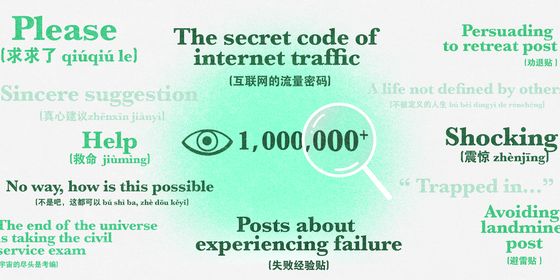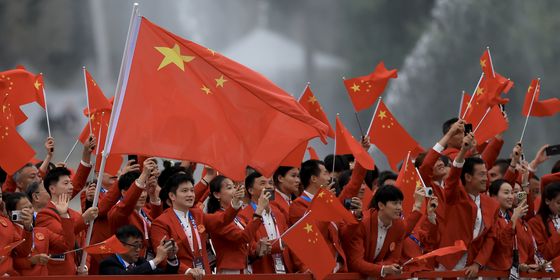The characters, words, and phrases that defined a rollercoaster year
Noted dictionary-maker and arbiters of Chinese language usage (and TWOC’s parent company) Commercial Press has unveiled the nominees for 2020’s Chinese Pandian, its 15-year-old annual competition to select the year’s most representative words, characters, and phrases on both the domestic and international stage.
As in previous years, entries were collected from the public through news portals such as People.com and Tencent News, social media apps such as WeChat and Kuaishou, and the official website of the Commercial Press. A panel of experts have reviewed and selected the following five nominees in four categories below, which anyone can vote on at People.com until December 21.
Just for fun, TWOC has also added its own suggestions for words and phrases of the year—throw our picks some love, or nominate your own, in the comments:
Characters of the Year (Domestic)
抗 kàng
Resist
Though typically used in warfare and with patriotoic phrases such as 保家卫国 (bǎojiā-wèiguó, protect the home and defend the country), the resistance on every Chinese speaker’s lips this year was directed against the novel coronavirus.
民 mín
The people; civil
The year posed many challenges to the lives of Chinese people, from a pandemic to poverty to natural disasters. With the country’s new Civil Code (民法典 mínfǎdiǎn) approved in May and set to go into effect in 2021, “people” will remain part of the coversation for a long time.
云 yún
Cloud
With schools and businesses closed, and social distancing measures in place for the first half of this year, China coped by adding 云 in front of regular social activities: including 云办公 (yún bàngōng, working from home), 云上课 (yún shàngkè, online classes), and even 云诊疗 (yún zhěnliáo, online medicine).
疫 yì
Epidemic
With human-to-human transmission confirmed on January 21, and the city of Wuhan shut down on January 23, the novel coronavirus quickly gained the status of an epidemic and led to a serious public health crisis.
安 ān
Peace
The winter’s pandemic, followed by a summer of natural catastrophes such as forest fires and the worst flooding on the Yangtze River since 2018, made peace precious to many.
Words and phrases of the Year (Domestic)
脱贫攻坚 tuōpín-gōngjiān
Tackling poverty alleviation
China’s goal was to eliminate poverty by 2020—and in our final issue of the year, we went to several locations, from Sichuan’s “cliff villages” to Zhejiang’s “rainbow island,” to check up on its progress.
口罩 kǒuzhào
Face mask
Proven to be effective against the transmission of airborne diseases since the Manchurian Plague of 1911, face masks saw a severe shortage in the early days of the Covid-19 outbreak, and continue to be required in public places all across China.
抗疫 kàngyì
Fighting epidemic
From scientists and medical workers to neighborhood committee staff and truck drivers, everyone played a role in the struggle.
逆行者 nìxíngzhě
Hero who run into danger
This phrase was coined in 2020 to describe the doctors, nurses, and other relief workers who voluntarily headed to Hubei province to assist the fight against Covid-19, as well as essential workers who continued to perform their jobs all across China despite the dangers.
健康码 jiànkāngmǎ
Health code
The Covid-19 pandemic saw an expansion in technologies in China to track the movements and health of its citizens, though the requirement to display one’s health code before entering public buildings and taking public transportation proved to be discriminatory to the elderly and others without smart phones.
Characters of the Year (International)
疫 yì
Epidemic
With first confirmed case of Covid-19 outside of China found in Thailand on January 13, and the first death reported in the Philippines on February 1, the novel coronavirus soon became a global pandemic.
乱 luàn
Chaos
From pandemics to protests to wars, the year has not been a peaceful one for the world.
限 xiàn
Limitation
Travel continues to be restricted inside and outside the borders of most countries, and China-US relations saw a number of new limitations including visa restrictions and proposed US bans on Chinese technology such as TikTok and WeChat.
选 xuǎn
Choose
The biggest election news of the year revolved around the US presidential race, but Japan, South Korea, and Myanmar are among some other countries that saw changes in political leadership in 2020.
变 biàn
Change
Whatever your feelings on this year, and whatever 2021 brings, it’s clear that the world will never be the same again.
Words and phrases of the Year (International)
新冠疫情 xīn guān yìqíng
Coronavirus epidemic
The World Health Organization declared Covid-19 a public health emergency of international concern on January 30, and estimates over 70 million cases and 1.6 million deaths from the disease worldwide as of December 15.
群体免疫 qúntǐ miǎnyì
Herd immunity
This controversial disease-control measure in some countries—aiming to expose a sufficient portion of the community to the virus so that they become immune, and can no longer spread the infection—raised ethical questions over the “sacrificing” of vulnerable members of the population for the good of the whole.
熔断 róngduàn
Circuit breaker
A term for temporary measures to halt trading to prevent a stock market crash, circuit breakers were in effect following crises in the US stock market in March. In China, the Civil Aviation Administration also issued temporary bans known as “circuit breakers” on airlines where passengers test positive for Covid-19 on arrival to China, in order to slow the import of the virus.
美国大选 Měiguó dàxuǎn
US elections
Going ahead despite social distancing measures, protests, and continued shocks to the economy, November’s presidential election in the US was the biggest news on the international stage for the second half of the year.
科比 Kēbǐ
Kobe
The death of US basketball player Kobe Bryant on January 26 devastated his millions of fans in China, most of whom were still reeling from the shock of Wuhan’s shutdown just three days before.
TWOC’s picks
社死 shèsǐ
Ever done something so embarrassing that you temporarily wished for death? This slang term, short for 社会性死亡 (shèhuìxìng sǐwáng), has spawned many online communities where Chinese youths relive stories of past humiliation and try to see the funny sides.
后浪 hòulàng
An inspirational slogan embraced by young Chinese, 后浪 praises the role of millennials in fostering innovation and positively shaping China’s future, though it has also been used ironically and adapted into terms like 韭浪 (jiǔlàng, “leek wave”) to describe some Chinese youths’ pessimism for their ability to make any change in their society.
古早 gǔzǎo
A term adapted from Fujianese dialect, 古早 refers to retro clothing, shows, and foods that are making a comeback, perhaps because everyone is so eager to forget this year.
内卷 nèijuǎn
Involution
Referring to the stagnation of a society after it reaches a certain point of development, this term was widely used by Chinese facing an especially hard year of job losses, business closures, and increased competition in school and work.
螺蛳粉自由 luósīfěn zìyóu / 秋天的第一杯奶茶 qiūtiān de dì-yī bēi nǎichá
Snail-rice noodle freedom/ The first milk tea of autumn
During the early days of Covid-19, a shipment of Guangxi’s famed “snail-rice noodles” to pandemic-stricken Hubei province reawakened netizens’ longing for the “freedom” of eating out at restaurants and getting package deliveries. With the virus more or less contained locally by autumn, there was a fad with friends, family members, and couples sending each other virtual “red packets” of money in reply to the message “秋天的第一杯奶茶,” which became a celebratory metaphor for the resumption of business and leisure across the country.
What do you think should be the words, phrases, and memes of the year?
Cover images from VCG












